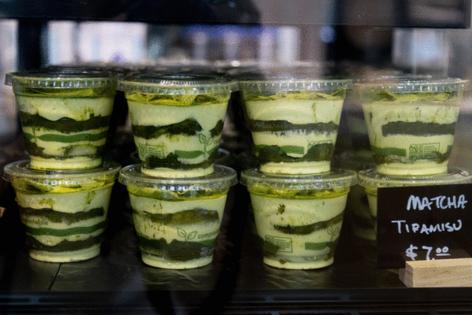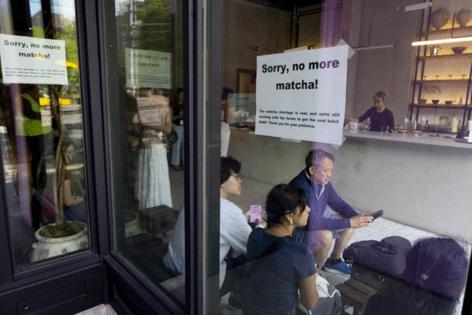It's not easy finding green as matcha shortage hits Seattle shops
Published in Business News
Matcha. It’s green. It’s grassy. And while beverages made with the powdered tea are all over social media, there’s one place they are missing: locally owned Seattle cafes.
Supply problems, compounded with increasing prices due to tariffs, have hit several local coffee shops hard, leading to a lowered inventory or, in some cases, no matcha at all. Despite the shortages, businesses say the matcha craze shows no signs of slowing.
Phê, a Capitol Hill neighborhood coffee shop, is one of the spots currently out of the tea.
“A lot of people, they get mad because they come here for matcha and we don’t have matcha,” Vy Le, partner in the company said. “We got a lot of bad reviews. But it is what it is.”
The shop sources all of its matcha, a finely ground powder made from green tea leaves, from a farm in Japan. With last year’s harvest sold and shipped, and this year’s harvest still being ground, the shop has been left in a matcha-less limbo.
Matcha leaves are typically harvested in the spring, dried and slowly passed through a stone mill to be prepared. With exploding international demand, pressure is mounting on Japanese farmers to increase production.
In 2024, matcha accounted for more than half of the total 9,698 tons of Japanese green tea exported — twice as much as ten years ago — according to data from Japan's Ministry of Agriculture, Forestry and Fisheries reported by Al Jazeera.
Other countries, such as Taiwan and Thailand, have been trying to replicate the powder. But true matcha fanatics like Le say there’s no replacing the process Japan has perfected through generations.
Matcha started trending in Western countries about a decade ago, spurred on by celebrity endorsements by figures like actress and health guru Gwyneth Paltrow. However, the tea has been a part of Japanese culture for centuries.
It originated in China and was brought to Japan by a Buddhist monk, taking off in popularity around the 12th century. The tea, which has been shown to decrease stress while slightly improving memory and attention, is used in the traditional Japanese tea ceremony and other rituals.
Annie Trinh said she has been drinking matcha for a long time, enjoying how the earthy, smooth flavor counterbalances the sweetness. The 22-year-old said she knew about matcha before it was trending, adding it is very much a part of her heritage. Trinh, who is visiting Seattle from San Diego, headed into Phê on Wednesday for the drink.
“It’s sad they don’t have it,” she said. “But there are other options.”
Starbucks, the global coffee company headquartered in Seattle, has not reported matcha shortages. The company recently changed its matcha recipe to be unsweetened. The former recipe included sugar premixed into the powder, leading to claims that it technically was not real matcha. Starbucks said it sources “100% matcha” from places like Japan, China and South Korea.
Phê, which opened its brick-and-mortar location a month and a half ago, has lost income in the two weeks it has been out of matcha, Le said.
The shop is hoping to have the tea back mid-July, and is currently speaking with additional Japanese farms. The shop could bring it back right away, as Le said it has had offers from many suppliers. But, Le said, she’s turned down sellers since the quality of matcha they bring are below her standards.
“I don’t want to sell any kind of matcha and then have people be like, ‘Oh this is not the same, I won’t come back,' ” Le said. “In the long run, it will cost us more than if we wait.”
Tariffs have also been impacting the business, as President Donald Trump’s 10% tax on Japanese goods have hiked up both shipping prices and baseline costs. Posting to social media on Monday, Trump threatened to set a 25% tax on goods imported from Japan and South Korea, as well as new tariff rates on a dozen other nations that would go into effect on Aug. 1.
Despite the rising costs and supply issues, Le said she thinks the shop will be OK. It has other popular sellers including hojicha, another Japanese green tea, and Vietnamese coffee.
Similar to matcha, Vietnamese coffee has trended across social media. But with matcha’s bright green color, perceived health benefits and polarizing taste, it’s the perfect fuel for a fad — and one that doesn’t seem to be abating anytime soon.
“A lot of people drink matcha because they enjoy it, people like me, who know the difference, the taste, the texture, the body and everything,” Le said. “But some people, they see it all over the internet, the hype, and they just say, ‘Oh let me try it.' ”
Bellevue-based shop Matcha Magic has been working to capitalize on the matcha frenzy by working with local influencers to promote the business. Akelia Johnson, manager of the shop, said it hasn’t made any deals with influencers yet but has some in the works.
Matcha Magic is experiencing the impact of supply chain issues as well, although not severely enough to take items off the menu. The shop also imports its matcha from Japan, but Johnson said they have suppliers who hold boxes of the product aside to cover the ebbs and flows of demand.
Matcha Magic doesn’t just put the powder in drinks. It has put matcha on acai bowls, which Johnson said were very popular.
“I always say, if you don’t want to drink matcha you can eat it,” she said.
Johnson has been with the shop since it opened in 2022. In that time, she said she’s never seen a matcha shortage like this one.
Every year, demand for the product only increases, she continued. The company is planning on opening three other locations by the end of the summer, in Redmond, South Lake Union and Capitol Hill. If supply issues get worse Johnson said these openings may be delayed, but doubts that will be a problem.
“Everyone’s into matcha, every demographic, race, age,” Johnson said. “Everyone loves matcha now or are at least giving it a try.”
©2025 The Seattle Times. Visit seattletimes.com. Distributed by Tribune Content Agency, LLC.















Comments